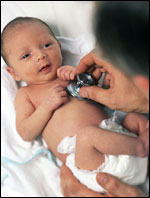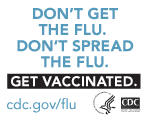Update: Measles Outbreaks Continue in U.S.
 CDC and state health officials are investigating and responding to cases of measles across the U.S. These cases remind us that it's important to vaccinate children and adults to protect them against this highly contagious disease.
CDC and state health officials are investigating and responding to cases of measles across the U.S. These cases remind us that it's important to vaccinate children and adults to protect them against this highly contagious disease.

CDC and state health officials are concerned about an increase this year in the number of measles cases and outbreaks (three or more linked cases) in the U.S. Measles is a highly contagious disease spread through coughing or sneezing. Symptoms can include rash, high fever, coughing, and runny nose. The disease can also cause more serious problems, such as ear infections, pneumonia, encephalitis (inflammation of the brain)—even death.
From January through July 2008, CDC received reports of 131 measles cases from 15 states and the District of Columbia—the highest year-to-date number since 1996. More than 90% of those infected had not been vaccinated, or their vaccination status was unknown. Many of these individuals were children whose parents chose not to have them vaccinated. Fifteen of the patients, including four infants, were hospitalized.
These cases remind us that it is very important to vaccinate children and adults to protect them against measles. Even though the ongoing transmission of endemic (native) measles was declared eliminated in the U.S. in 2000, the disease is still common in many other countries. Worldwide, 20 million cases of measles still occur each year, and the disease is a significant cause of vaccine-preventable deaths among children. In 2006, about 242,000 children died from the disease.

The measles virus can be imported into the U.S. by foreign visitors or returning travelers who are not fully protected against the disease. Close to 90% of the measles cases reported this year in the U.S. were either acquired abroad or linked to imported cases. Many were related to cases imported from Europe. Once in the U.S., the virus spreads through a variety of settings, including homes, childcare centers, schools, hospitals, emergency rooms, and doctors' offices.
No matter where or why the next outbreak of measles occurs, the best way to protect your children, yourself, and others from the disease is to keep up to date on vaccinations.
The measles vaccine is administered as MMR, a combination vaccine that provides protection against measles, mumps, and rubella. The MMR vaccine is strongly endorsed by medical and public health experts as safe and effective. All children should receive two doses of MMR vaccine. The first dose is recommended at 12–15 months of age and the second dose at 4–6 years of age.
All adults born during or after 1957 should receive at least one dose of vaccine unless they have documented evidence of measles immunity (through a blood test or a physician's diagnosis of measles). Two doses are recommended for all international travelers, healthcare personnel, and students attending secondary and post-secondary school. Infants 6–11 months of age should receive one dose prior to travel abroad.
More Information
- To learn more about measles and the MMR vaccine, go to CDC's Measles Vaccination page.
- For additional information on measles cases reported in the U.S. in 2008, read Update: Measles — United States, January–July 2008 (MMWR, 22 August 2008).
- To learn about a 2007 measles outbreak in the U.S. and steps that can be taken to prevent future outbreaks, listen to "Measles Can Travel" (
 4:01 minutes).
4:01 minutes).


